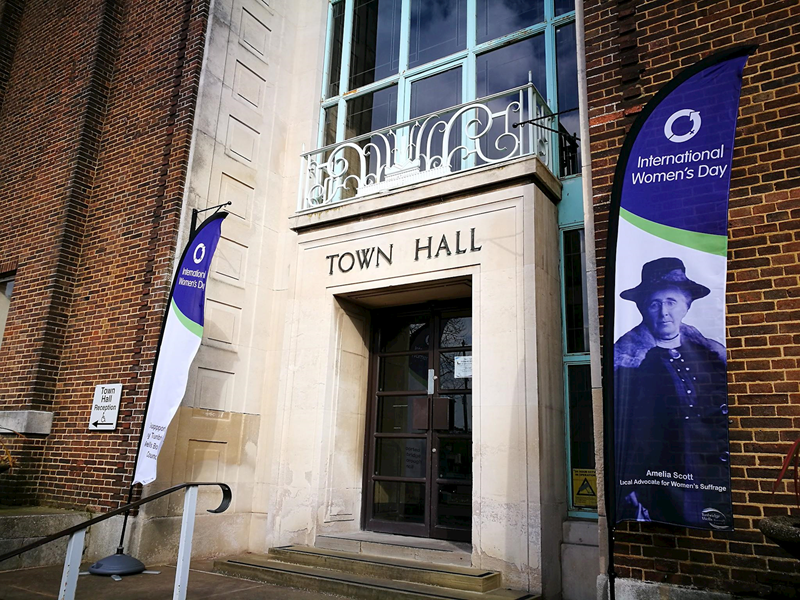Tunbridge Wells event set to commemorate Suffragette and Suffragist movements
Hundreds are set to follow in the footsteps of Suffragettes and Suffragists by marching in Tunbridge Wells, 100 years after some women were given the right to vote.
Talks, music and re-enactments have also been planned for the celebration to be held on International Women’s Day next Thursday [March 8].
The organising group TW Women 100, formed of a coalition of political and community bodies, are keen to mark the achievements of prominent Suffragists, such as Amelia Scott, who played their part in a strong Tunbridge Wells movement to fight for equality.
Miss Scott, who was one of the town’s first female councillors, helped organise marches from Tunbridge Wells to Hyde Park for mass rallies in 1909 and 1913.
Carol Wilson, Chairperson of Labour Women’s Forum, has helped organise a shorter walk from The Pantiles to the Town Hall.
Tunbridge Wells Tow Hall will be decorated with bunting in suffrage colours of purple, green and white as Mayor Julia Soyke hosts a reception after the march.
There will also be events inside Royal Victoria Place and The Forum (see panel). Donations collected at events will be given to Tunbridge Wells domestic abuse charity DAVSS.
Mrs Wilson said: ‘It is a time of looking back and appreciating what women have done all over the world and what women are suffering.
‘There is a huge groundswell of women in Tunbridge Wells who worked hard on the Take Back The Night campaign [in the 1970s] against domestic violence.
‘But there is still a huge amount of work to be done. We need to remind women that they need to be using their voice to vote.’
Amanda Turner, of Tunbridge Wells Women’s Equality Party, added: ‘We got the vote but we have not got equal representation yet.
‘Our motive is 100 years and still marching. It is extraordinary that in 2018 we still do not have equality. We want to commemorate those women 100 years on and say thank you to them, but the work is not done.
‘We had the equal pay act 45 years ago but figures show there is not equal pay.
‘I think it’s interesting that Tunbridge Wells has always had such an active political presence from women.’
Suffragettes, the organisation made famous by Emmeline Pankhurst and Emily Davidson, had a strong presence in the town and, according to many, burnt down the cricket pavilion at the Nevill Ground after being told women’s place in the game was ‘to make tea’.
Amelia Scott was one of a number of Suffragists, another group who fought for change but through more peaceful measures. The group had around 450 members in Tunbridge Wells alone.
Their work in the early 20th century helped pave the way for the 1918 Representation of the People Act which allowed women aged over 30 and with £5 of property to vote.
Women were first able to vote in the December General Election of that year, which was also the first time women were permitted to stand for election.
Labour Councillor for Southborough and High Brooms Dianne Hill said: ‘We are expecting hundreds to come on the march. It is a women’s event but men are welcome – they were supportive in women getting the vote as well.
‘There will also be a march in December because that is when women could first vote. The idea first came from the Labour Women’s Forum but it is not a political thing at all. It is an event to bring women together.’
Gillian Douglass, chairperson of Tunbridge Wells Liberal Democrats, said: ‘It is important to commemorate that women’s voices are heard and represented because they face different challenges from men and are often discriminated against.
‘I believe that a world in which there is no gender discrimination is better for everybody. It means that we are not forced into roles which do not fit us particularly well, we are allowed or, perhaps, even encouraged to follow our dreams.’








